Burningman: “The Playa provides”
- Will Falize
- Sep 22, 2025
- 9 min read
Updated: Nov 4, 2025
One moment you’re building a city together, the next a storm tears it down. You learn to let go, to laugh, to start again. In giving and losing, the Playa provides its greatest lessons.
Text and photography by Will Falize

That's on my bucket list Everyone has a bucket list. But how often do we actually dare to say yes when the opportunity presents itself? For me, it started when I met visual artist Leandra Arjona-Jacobi of Studio HER. She told me she was going to Burning Man. I immediately thought, "Holy fuck, you're going to motherfucking Burning Man? That's on my bucket list."
"Do you want to come?" she asked. My instinctive response was, "Uh... of course I do."
The next day, it turned out to be serious. Lucas, one of the collaborators of Camp Phantasmagoria, had agreed. I realized I'd said yes to one of the greatest adventures of my life on impulse and that I couldn't go back. At home, the puzzle began. My daughter, the dog, the horse—everything had to be arranged. Doubt sometimes overtook me, but my fellow filmmaker and friend Julius Ponten gave me the final push. "Will, you have to go. Find yourself there. Afterward, we'll make a documentary series for tv that will delve us deeply."
And so, weeks later, I was on a plane to Reno, USA. But to understand where I would end up, you have to know how it all began.
The Birth of Burning Man In 1986, Larry Harvey and Jerry James dragged a three-meter wooden figure to Baker Beach, San Francisco, and set it on fire. People gathered spontaneously—dancing, singing, crying. It wasn’t a festival or a concept, but a ritual.
In the ’90s, the fire moved to the Black Rock Desert. There, Black Rock City arose: a temporary city that lives for ten days and then completely disappears. No logos, no sponsors, only ten principles: radical inclusion, gifting, decommodification, radical self-reliance, communal effort, leave no trace, participation, civic responsibility, immediacy, and radical self-expression.
And this year, 2025, I was there for the first time. How do you share such an adventure? I chose anecdotes and interviews with fellow burners from my camp: Phantasmagoria.

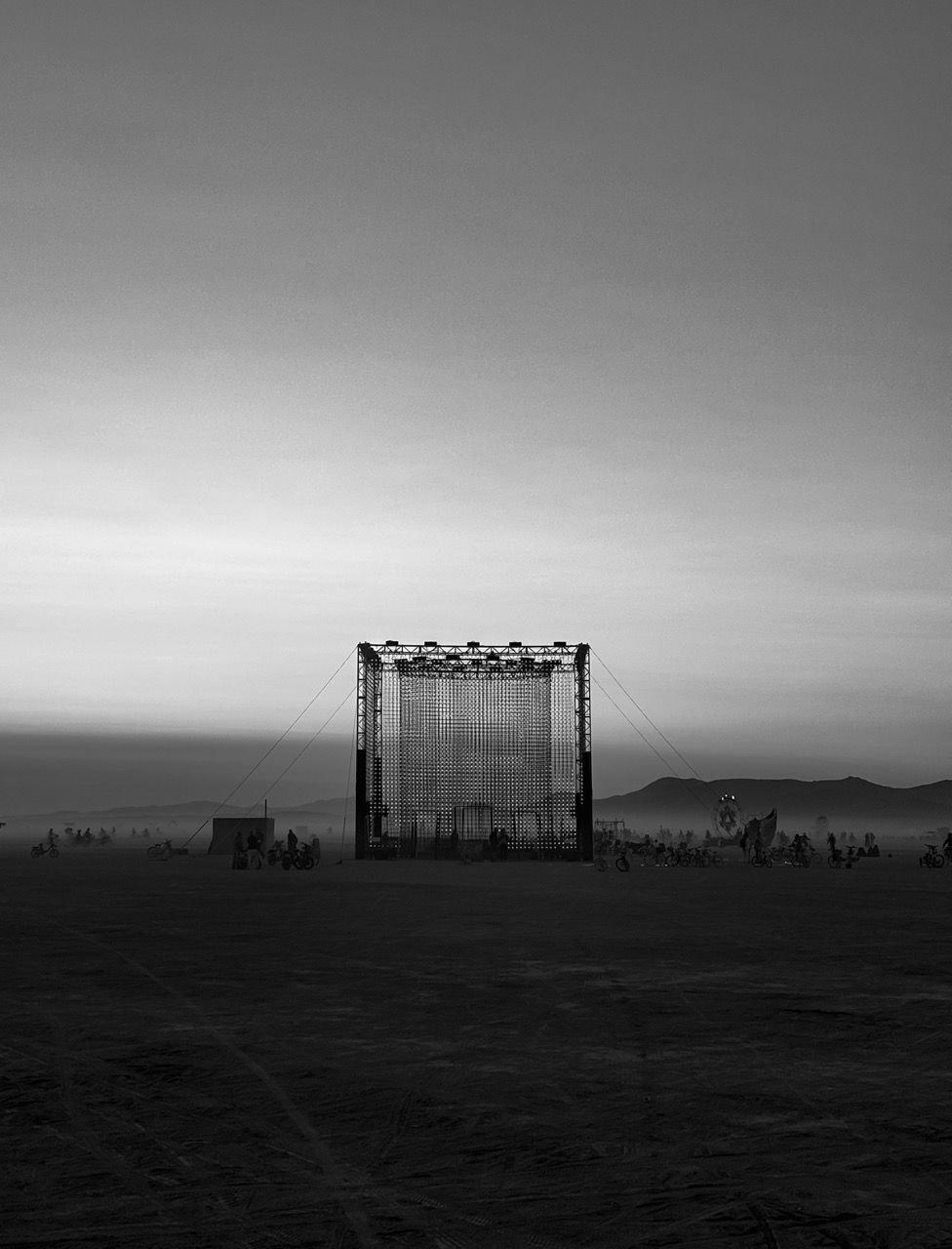
Reno – First Meeting with the Family
After three flights, I landed in Reno, Nevada. The casino hotel was overwhelmingly large. As I played blackjack and won, I felt a strange sense of calm. As if the universe was saying: let go, Will!
The next day we met the first group from Phantasmagoria. Lucas introduced me to Leo , a man from Queens, New York. I wasn't feeling my best that day due to the long journey and jet lag (and the whiskey), but thanks to Leo's warm-hearted nature and friendly personality, I quickly caught on to his energy. We went to Walmart together to pick up essentials. He told me he was from Kew Gardens, near Forest Hills—the place where my daughter was born. That touched me deeply. Five years ago, I had moved to the Netherlands to give her a better future. Now here I was, back in America for the first time, on my way to a place where nothing was self-evident.
That night we slept in his car in the casino parking lot. At four in the morning, we left in a procession of cars for the Black Rock Desert. As the mountains revealed themselves in the morning light and Leo provided the soundtrack, I felt the realization sink in: I did it. I gave myself a gift!


Arrival – The storm that broke everything After a five-hour drive, Black Rock City loomed. Our camp was at 4:00 and Esplanade, in the center of the city's circle on the Playa. The streets are organized like clockwork, with avenues and streets. Everything was meticulously planned, as if chaos and order have made a pact here. I had signed up as a builder, so I had to get started right away due to the delay. Containers were opened: furniture, canvases, tents. Everything had to be set up. The sun beat down mercilessly, 38 degrees, dust in your lungs. And then the storm hit. Within minutes, the sky was white. Visibility dropped to a meter. Everything flew away. I ran to a container where a group of Berlin chefs were sheltering. Inside: wine, food, laughter. Outside: the worst storm in years.
When it subsided, our camp was a battlefield. Tents gone, kitchen destroyed, art cars damaged. Burning Man immediately revealed its essence: you own nothing, everything can disappear. Only community remains.

Asia – Longest Legs and the Heart of a Community
“They call me Longest Legs,” she says with a smile. That’s how everyone knows her on the Playa. Asia’s Burning Man adventure began in 2010, when friends unexpectedly took her along. “I had no idea what I was getting into. But that first time… it set everything in motion.”
In 2011, Phantasmagoria was born, with the art of Adam Christoph and an art car. What started as a camp of thirty people grew into a community of 170 participants on the Esplanade, one of the most visible places in Black Rock City. “Our camp doesn’t belong to one person,” Asia explains. “It belongs to everyone who helps build it. That’s what makes it so special.”
A Temple that Connects
At the center stood a new temple, designed by Christoph: two connected towers inviting visitors to climb, play, and connect. “It’s our largest build ever,” Asia says proudly. “A place that isn’t just beautiful, but also brings people closer together.”
Phantasmagoria is known for its creativity and hospitality, and has been recognized several times as one of the most beautiful camp structures at Burning Man.


Lucas – Tech, Art and the Humor of the Playa
Lucas grew up as a hacker. “I’d spend nights behind my computer, breaking into systems. Not to cause damage, but to understand how things worked.” At the same time, he was organizing parties, drawn to music and chaos.
“For years those two worlds—technology and art—never really came together. At Burning Man, they finally did. Here I can pour my whole heart into both.”
The Night of Elon Musk
Lucas reminds me of a night we were on the Playa when the desert played one of its jokes on us. “We were cycling with a small group and got lost. First we ran into Elon Musk’s brother. Five minutes later we stumbled upon an artwork that said: ‘Fuck you Elon.’ And right after that, Starlink flew overhead. Three Elon moments in five minutes. That’s Playa humor. You can’t plan it—you just have to laugh.”
Why He Returns
For Lucas, Burning Man is the rare place where his love for technology and art fully comes together. “You can design a system, build a camp, run cables and solder connections—and then dance all night under lasers and fire. It’s the only place where it all makes sense together.”
He pauses, then adds: “People can’t really change you. But a place can. And for me, this is that place. Burning Man is my yearly reset. Out here I strip everything back to the core, and I return home lighter, clearer, ready to begin again. That’s why I’ll always come back. The Playa provides.”

Leo – The Hour That Changed Everything
Leo speaks with an energy that immediately pulls you in. He smiles wide. “For me, it’s about being seen. Not in an ego-driven way, but as a human being. To give love, to give expression back without being self-conscious. Burning Man taught me that it’s all about giving, for as long as it can be held.”
On the Edge of Leaving
In fact, Leo was almost gone. The Man had burned, his bike was packed, his plan was set: head for the Redwoods. He even suggested I ride along with him. But then friends from the camp called out: “Stay just one more hour!”
That single hour changed everything. He stayed. First a drink, then a conversation, and before he knew it he was being carried from camp to camp. Until, in the middle of the night, he found himself at Mayan Warrior. There he felt surrounded by what he calls “angels”: Julia, Mustafa, Pepo – people who welcomed him as if he had always belonged.
The Playa Changes You
He once thought he would only go once. “But the moment I was there, I knew: I have to come back. Every single year. It’s a place that keeps changing – and keeps changing me.”
I later told him that Julia and Mustafa had given me a ride to Reno, and asked me to tell him they loved him. That the last day and night had been magical for them. Leo laughed. “See? That’s the Playa. Stories cross each other, even when you think you’re traveling alone. It’s all one big connection.”

Mariana – Criticism, Black Coffee and Truth
A Positive Experience
“It was a positive experience,” Mariana says. “Mentally, physically, spiritually – I felt good. Of course there were storms and chaos, but that’s exactly what gave me strength. It was a blessing to be there and to meet all those beautiful people.”
Freedom or Façade
She’s honest about her critique. “The art? Incredible. The sun? Fantastic. But some of the parties felt empty – so many drugs, so much hypersexuality. For me that wasn’t real freedom, but a façade. This is a playground, not a society. People call it a social experiment, but I doubt that.”
Still, she adds: “That’s not negative. I’m already on my path. For me, freedom is the fuel of the soul – freeing yourself from pain and old stories. That is my work, my art, my life.”
The Night of Black Coffee
Her favorite moment came on a rainy night. “Everything felt dead. Until we heard that Black Coffee was going to play somewhere. We walked an hour and a half through the mud. And then there he was – my favorite DJ, for maybe thirty, fifty people. It felt like a private concert. As if the Playa had given us a secret.”

Maria – Stitch and the Art of Receiving
Community in the Storm
“It’s nothing like a festival,” Maria says. “It’s about kindness, creativity, and community.” She felt that especially during the storm at the start of the week. “Everyone helped each other. That creates a deep bond.”
Stitch
She gave herself one mission: to be in the moment. “Normally I plan everything. Here I wanted to relax and receive. That was new for me.”
An accident in the bathroom became a turning point. “Everyone came to help, and days later they kept asking how I was doing.” I remember helping her to the car, together with Lucas and others. Maria ended up with twelve stitches—and the nickname Stitch. “I’m used to carrying everything on my own. Here I learned that I can also let myself be carried. That I can receive.”

Captain Leopard – The Last Man Standing
His Playa name is Captain Leopard, but behind that nickname lies a man who breathes responsibility.For four years, he has been part of Phantasmagoria, one of the largest camps at Burning Man.What started as a logistical role evolved into full leadership of the camp.“When our leader broke his arm and legs during an earlier edition, I had to take over everything,” he says.“The bathrooms, the food, the entire operation. And from that moment, I did it as a kind of calling.”
The Desert as a Mirror
For Alex, Burning Man as he calls it is, “a social human experiment.” “The more you give,” he says, “the more you receive.”
When I ask him what he would tell others, he smiles for a moment.“You can’t buy a ticket to Burning Man,” he says.“Burning Man has to call you. You have to be ready for it.”And once you go, you keep coming back.Year after year.

Serra – The Storm and the Mirror to Myself
On the third day I met Serra at a party a few avenues away. Her boots and the tattoo on her hand caught my eye. I gave her a compliment, she smiled, and kept on dancing. Hours later, a storm hit—wind, dust, mud. Bikes became useless, parties stopped. And there she was again, alone. “You still here too?” I asked. “I’m stuck,” she said.
Something in me felt called. “Listen Serra, I’d like to donate my time and effort to get you safe to the other side.” Surprised, she took my arm. We left our bikes behind and pushed into the storm. First our shoes grew heavy with mud, then we abandoned them, walking barefoot, arm in arm, across an empty Playa. At the Man we paused, amazed to find it completely deserted—normally a sea of lights and art cars, now just ours. Hours later we reached her camp. She smoked a cigarette in my jacket, I took a photo, and we said goodbye.
Two days later I returned her bike. She was grateful, and that brief reunion flowed into one of my most powerful burn experiences: 24 hours of music and dancing, closing with sunrise at Mayan Warrior as Rufus du Sol played.
But Serra wasn’t just a passing encounter. She held up a mirror to the man I want to be—the one who gives without expecting anything back, who chooses connection over comfort, who can walk a stranger through the storm and find strength in it.
And maybe that’s what the desert kept asking me: who are you, really? From building the camp in the heat to facing storms head-on, I felt tested, not on endurance alone but on character. Every run, every climb, every moment of discipline had led me here. I realized I didn’t need to push past limits; often the real choice was rest, intimacy, and genuine connection.
As Leo once said, Burning Man is about being seen—not for your ego, but for who you’ve become. And I saw myself too. Not only the adventurer my friends once called Free Willy, but also the father, the builder, the man I am now. The Playa gave me a 'Playa-name' that ties both together: Free Will. Nice to meet you. Hahaha. Life really is one big adventure.
Epilogue – The Lens as a Gift
Besides words, there are images. Portraits like my Playa-gift . Black and white, because color would dictate too much. By removing the color, I took back control after Burning Man had held power over me for 12 days.
I couldn't photograph everyone—storms and chaos prevented that. But the faces that are there reflect the rest. And so this story is incomplete. But just like Burning Man itself, it's true for that very reason.


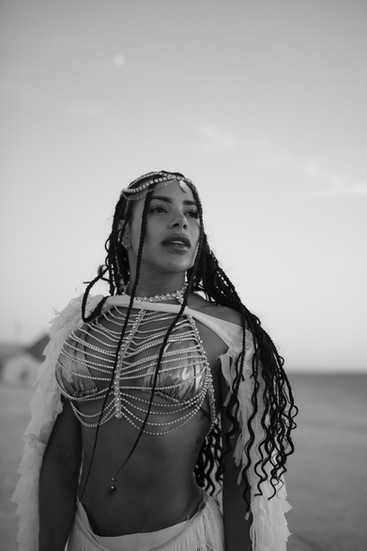















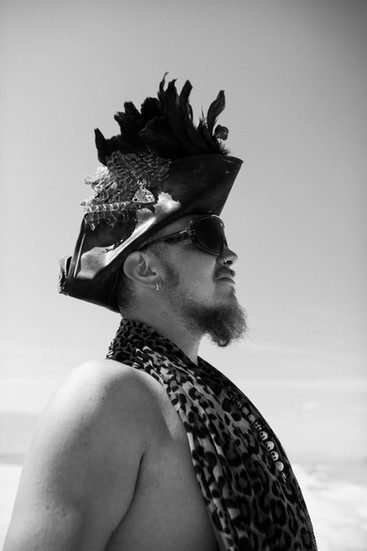











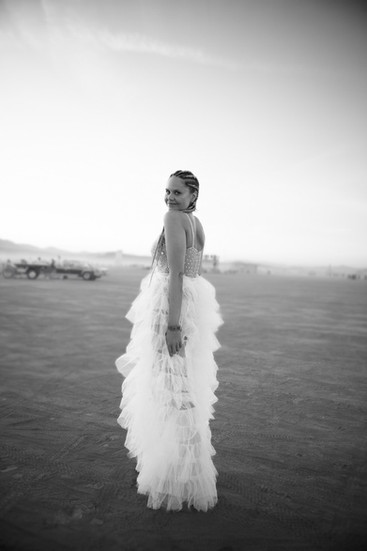







































































































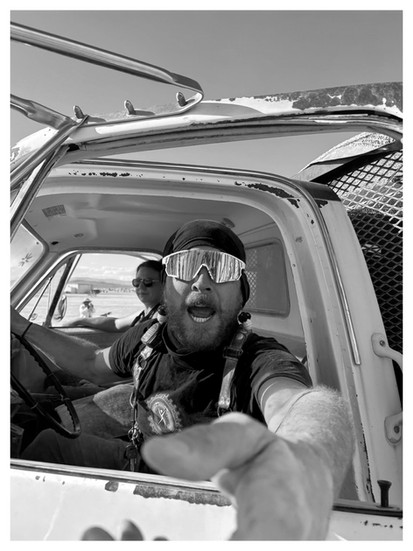













Comments